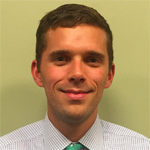A: The ACR has allowed fellows to be active by attending the annual conference. This has been a great opportunity for networking and career information. In practice, I frequently use their website for information regarding billing, classification criteria and patient handouts.
 Zachary Wallace, MD, Fellow, Division of Rheumatology, Allergy and Immunology, Massachusetts General Hospital, Boston
Zachary Wallace, MD, Fellow, Division of Rheumatology, Allergy and Immunology, Massachusetts General Hospital, Boston
Background: In Dr. Wallace’s third year of medical school at Georgetown University, his attending was a rheumatologist named Sean Whelton, MD. One day, a patient with lupus was on the census.
“I became very interested in her case and subsequently spent time with Dr. Whelton and other rheumatologists in outpatient clinics,” Dr. Wallace adds. “I thoroughly enjoyed the experience of meeting these patients, learning about their conditions, realizing how much we still do not know about them, and recognizing how the field was changing rapidly with the introduction of new effective medications. By the time I started residency, I was pretty sure I was going to pursue rheumatology.”
After Georgetown, Dr. Wallace did his internal medicine training at Massachusetts General, where he’s finishing the last year of his rheumatology fellowship. In conjunction with the fellowship, he is completing a Master’s of Science in epidemiology at the Harvard T.H. Chan School of Public Health in Boston.
Q: What is it about rheumatology that keeps you so engaged?
A: There is so much to learn! Whether it is in clinic or doing clinical research, I am always facing new challenges and learn new things every day. It’s an absolute pleasure to know that I am helping people through my clinical work and my research.
Q: What is the most fulfilling part of your job?
A: Like every job, there are good days and bad days. But the best part of my day are the people I get to work with every day. I am surrounded by intelligent and motivated people who drive me to achieve the best I can.
Q: What advice do you have for the next generation of rheumatologists?
A: Take chances. As a post-call intern one day, I fired off an e-mail to Dr. John Stone to express my interest in rheumatology and see if there were any research opportunities I could get involved in. Five years later, I have him to thank for the great career I am off to as both a clinician and a researcher.
Q: If you could change one thing about the field of rheumatology, what would it be?



